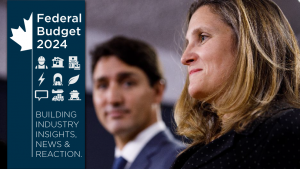The Canadian Public Works Association (CPWA) supports a pre-election debate between all federal political leaders on municipal issues and is encouraging the public to carefully consider the platforms of each party.
"I think the call for a debate goes to the fact that future municipal infrastructure is critically important for all Canadians, because infrastructure plays a part in their everyday lives," said Kealy Dedman, CPWA president. "So, the issue needs to stay at the top of the election agenda and the debate would certainly put it front and centre."
The mayors of Canada’s largest cities met with leaders of the federal political parties at the Federation of Canadian Municiaplities (FCM) conference on June 4 in Edmonton,
Alta. to discuss their agendas in the lead up to the next general election, on Oct. 19, 2015.
The mayors questioned representatives from the New Democratic Party (NDP), the Liberal Party and the Green Party on their plans to partner with cities on transit, infrastructure and housing.
At the same time, the three opposition parties agreed to participate in a debate on municipal issues. The Conservatives have not yet accepted the FCM’s invitation.
"The CPWA membership are involved in everything from the planning, the design, the construction, operation and maintenance of public infrastructure in Canada," said Dedman.
"Clearly we are keen to hear from the federal parties on what their commitments are for supporting municipal infrastructure. So, when we heard of this we jumped on board to join the Federation of Canadian Municipalities (FCM) in calling for a debate."
The big city mayors’ conference kicked off FCM’s annual conference, which was attended by more than 2,000 mayors, city councillors and participants.
"It’s no secret that we have a huge infrastructure deficit, which is an enormous burden for our communities," said Dedman.
The FCM estimated in 2007 that the infrastructure deficit in Canada for existing municipal infrastructure was $123 million. If federal and provincial deficits were included, the Canadian infrastructure deficit could be between $350 and $400 billion.
The FCM argues the most urgent financial issue facing Canadians is the high cost of housing, due to low levels of investment in the construction of purpose-built rental apartments.
According to an FCM study released in May 2015, almost one-third of households are renters, but only 11 per cent of housing starts since 1996 have been intended as rental units.
The declining rate of rental construction has left insufficient stock, especially when it comes to lower-rent units. The stock of these units is declining rapidly.
In addition, municipal leaders are concerned about the pending loss of a $1.7 billion in federal housing funding by 2020.
In response to this situation, the FCM called on federal leaders to participate in a pre-election debate, which would inform the public on municipal issues. FCM is asking all parties to commit to sustaining existing investments in housing and increasing the supply of affordable rental units.
Liberal leader Justin Trudeau is promising to support investment in public transit and infrastructure, while proposing a new revenue source dedicated to local governments. He has also promised to support the construction of new affordable purpose-built rental housing.
NDP Leader Tom Mulcair is proposing to increase the gas tax amount transferred to municipalities by $1.5 billion per year, which will provide stable and long-term infrastructure funding. He is also promising to provide incentives to increase affordable rental options and invest $1.3 billion annually in a dedicated public transit fund.
Elizabeth May, Green Party of Canada leader, is proposing to commit one point of the GST to municipal priorities. May also recognizes the need for all levels of government to focus on increasing the supply of affordable housing.
Municipal leaders support the Conservative government’s infrastructure and transit plans, but they argue it fails to incorporate affordable housing.
The 2015 federal budget was tabled in April launched the Public Transit Fund, which will provide PPP Canada Inc. with $750 million over a two year period, which starts in 2017–18. After this initial period, the fund will invest $1 billion annually into transit infrastructure projects going forward.
The federal government launched the $14 billion New Building Canada Fund in March 2014, which provides stable infrastructure funding for a 10-year period.











Recent Comments
comments for this post are closed